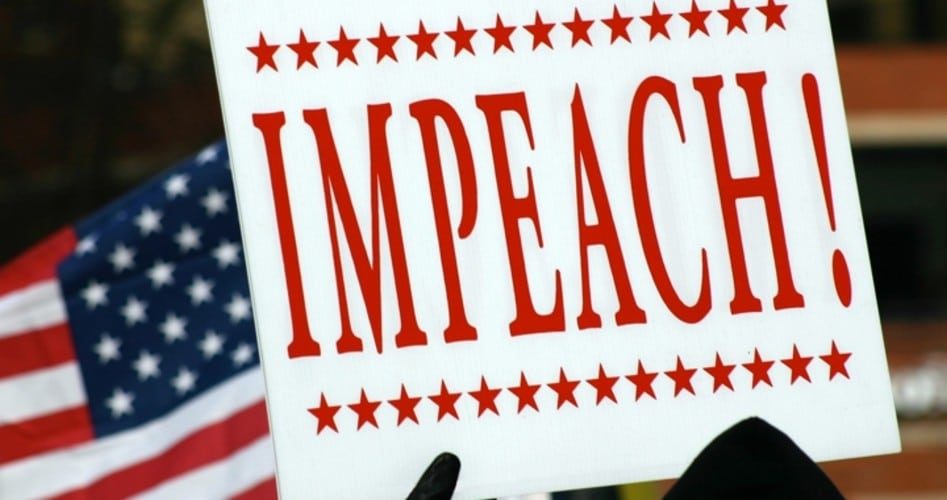
It’s official: Peter Baker, the chief White House correspondent for the New York Times, the mouthpiece for the liberal establishment, has written that, if the Democrat Party takes the House in the midterms just three weeks away, it will move to impeach the president in the next Congress: “While Democrats are largely ducking the topic on the campaign trail, few in Washington doubt that impeachment will be on the table if they win the House on Nov. 6.”
And, warns Baker, such impeachment proceedings are likely to make the Kavanaugh confirmation hearings look like a Sunday School class disagreeing over which Scriptures to study:
If that happens, anyone who thought the battle over Justice Kavanaugh’s confirmation was ugly and divisive should buckle up, because history suggests it would provide only a small taste of what lies ahead. The impeachment drives against Andrew Johnson, Richard Nixon and Bill Clinton tore at the nation’s fabric, but an effort to remove Mr. Trump could lead to an even more incendiary conflict, thanks to the advent of social media and Mr. Trump’s brand of blowtorch politics.
Mr. Trump is already taking the threat seriously and using it as a campaign tool to rouse Republican voters from their lethargy. At a rally in Iowa last week, the president scoffed at the threat: “You get impeached for having created the greatest economy of our country, just about, right? The best job numbers in the history of our country, just about, right? The greatest trade deals, which we’ve just finished, in the history of our country?”
Deep into his article, Baker admits that such an effort is likely doomed to fail: “A Democratic House might impeach him, but even if Democrats take the Senate, they would still be far from the two-thirds necessary for conviction, meaning that 15 or more Republicans [in the Senate] would have to go along. Such a scenario seems unlikely.”
So it’s a political tactic that could fail, but the House could come up with enough charges under the 25th Amendment to impeach the president, especially if California Representative Maxine Waters assumes the chair of the House Financial Services Committee. Given that committee’s power to subpoena Trump’s income tax returns and other financial records, Waters hopes to find something of substance to help build the impeachment case: “If there is information [there] that is going to be unveiled about what has been going on in the White House or Donald Trump or the Treasury, it will come out.”
It all depends on if the Democrats succeed in flipping 24 seats on November 6. The tides shift on almost a daily basis. Following the Kavanaugh confirmation hearings, an NPR/PBS News Hour/Marist poll showed that any “wide Democratic enthusiasm advantage that has defined the 2018 campaign up to this point has disappeared,” with the director of the poll admitting that “the Republican base was awakened” by those hearings.
Last week’s generic poll from Rasmussen showed that the gap favoring Democrats since the first of the year had disappeared entirely.
But the CBS News/YouGov Battleground Tracker’s results released on Sunday showed that “our Democratic seats estimate has slowly but steadily ticked up … this summer. Our current estimate is four seats higher than it was in August. CBS News concluded:
If the elections were held today, Democrats would stand to win 226 seats (more than the 218 needed for a majority) with Republicans winning the remaining 209.
[But] the margin of error on each of these estimates is plus or minus 14 seats, which means that there’s still the prospect of Republicans retaining control. This range of possible outcomes in the model is wider than it was this summer. Many key races are extremely close, and it wouldn’t take much movement from where things stand now to swing many seats in either direction.
And the Cook Political Report has the Democrats taking 205 House seats and the Republicans taking 199, leaving 31 a “toss-up.”
The view from across the pond is helpful. The Telegraph, the British daily newspaper, has been conducting its own polls, which “show that the Democrats are around [seven] percentage points ahead of the Republicans, standing at an average of 47.1 percent compared to the Republicans’ 40 percent.” But, added the Telegraph, “Both the House of Representatives and the Senate are decided by a series of local elections, which means that the Republicans may still hold both houses.”
The wild card is the president himself. Committed to a last-minute blitz of campaign rallies to support those local Republican candidates, the president’s own poll numbers are improving significantly, especially since the successful Kavanaugh confirmation and the release of Pastor Andrew Brunson from Turkey over the weekend.
Image: BenThomasPhoto via iStock / Getty Images Plus
An Ivy League graduate and former investment advisor, Bob is a regular contributor to The New American magazine and blogs frequently at LightFromTheRight.com, primarily on economics and politics. He can be reached at [email protected].
Related articles:
Pastor Released from Turkish Prison Prays for Trump in Oval Office


